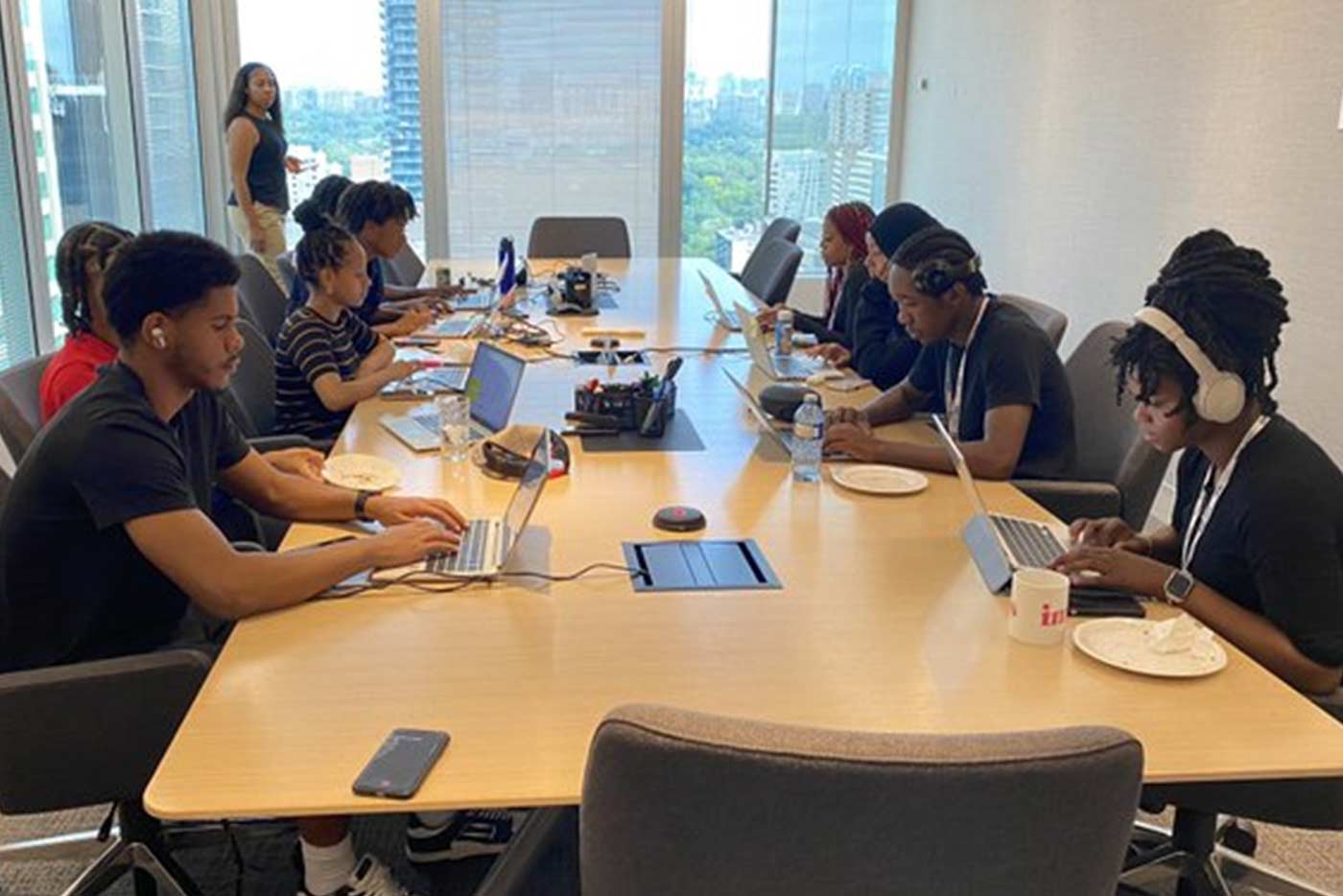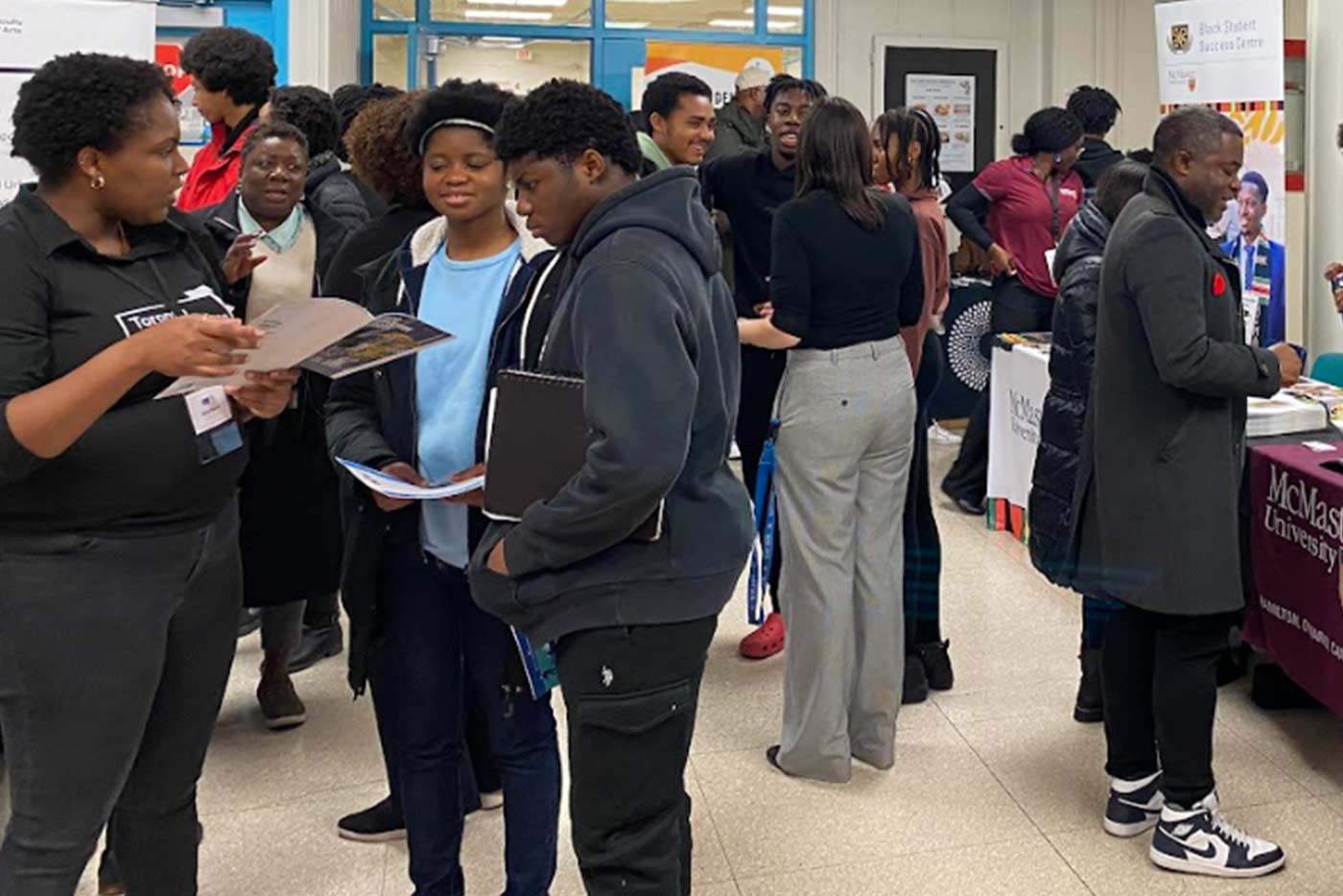The TDSB has made a bold commitment to equity, human rights, anti-racism and anti-oppression. This sets the foundation to support those who have been underserved both traditionally and currently and will raise the bar for all students. The Equity, Anti-Racism and Anti-Oppression team works with educators in schools to support co-planning with equity leadership teams to ensure that school improvement equity goals reflect these commitments through professional learning, culture building, and fostering strong partnerships within school communities.
Affinity spaces
Affinity spaces are supportive environments where individuals with shared identities or experiences can connect, learn, and engage with one another. These spaces foster a sense of belonging and community, allowing participants to explore their identities and share perspectives in a brave and inclusive setting.
Research consistently highlights the value of affinity spaces in developing a positive self-image, enhancing mental health and well-being, and advancing social justice. In TDSB schools, these spaces provide students with opportunities to cultivate belonging and revitalize whole communities so that they can thrive.
During the 2023-24 school year, over 1,000 students participated in different affinity spaces throughout the city. These spaces provided opportunities for students within affinity to gather, share experiences, celebrate, and learn from one another.
Connection through the EnVision Conference
This year at the annual EnVision Conference, over 1,100 2SLGBTQIAP+ elementary and secondary students and their allies attended virtual and in-person session offerings. This year's theme Queer Futurisms: Centering Trans Kids and Affirming the Intersecting Identities of Indigenous, Black, Racialized and Marginalized 2SLGBTQIAP+ Communities was embodied by event keynote speakers Ravyn Wngz and Shanese Anne Steele.
Over three days, around 20 workshops focussed on 2SLGBTQIAP+ topics for students and staff. Taking a collaborative approach to identity affirmation, sessions were led by students, staff and community partners. Session themes included affirming intersecting identities, an Indigiqueer workshop, peer support, April’s Latin-America History Month, ballroom arts and printmaking.
Over 100 staff from across the district including the EnVision Steering Committee, Equity Department, Gender and Sexual Diversity Team, Centre of Excellence for Black Student Achievement and Urban Indigenous Education Centre came together to support an educational space which cultivated a sense of joy, engagement, and belonging for TDSB students.

The Centre of Excellence for Black Student Achievement
The Centre of Excellence for Black Student Achievement is the first of its kind in public K-12 education in North America. Established in 2021, it was built on community voice following the recommendations, advocacy and work of Black communities.
Honouring the ongoing work in the Centre of Excellence, staff continue to partner with Black students, families and community members to identify challenges that must be met, and provide results from well-implemented programs and initiatives centred on school, family and community partnerships.
Each year the Centre of Excellence utilizes a collaborative, multidisciplinary team approach to support Black students, while also enhancing the engagement and involvement of Black parents, caregivers and community members. The experiences noted below highlight the myriad ways in which the Centre of Excellence honours the voices, experiences and advocacy of Black families and community members to support academic achievement and the wellbeing of Black students.
The Inspired to Excel, Africentric and Culturally Relevant Pre-Kindergarten and Kindergarten Program
This program was held at nine locations across the city in twelve separate classrooms. A total of 184 early learners and their families engaged in rich learning experiences that were anchored in enhancing their sense of belonging and positive identity development.
Through rich and culturally relevant learning opportunities, students were affirmed in the curriculum and developed greater self-awareness. Families and learners in the Inspired to Excel program were also provided with community educators focus on African drumming, spoken word, visual arts and Reggaecise.
As an added celebratory experience, students, families and educators will be invited to the 10th year anniversary of the Inspired to Excel, Africentric and Culturally Relevant Pre-Kindergarten and Kindergarten event, which was hosted in Fall, 2024.
The Black Student Summer Leadership Program
The Centre of Excellence for Black Student Achievement commenced its sixth year of the Black Student Summer Leadership Program. The program brought together 96 Black TDSB student leaders in grades 10 to 12 to engage in mentorship, skill development opportunities and paid work placements.
During the summer, students were matched with one of 26 experiential learning agencies, representing a variety of employment sectors and educational training opportunities. The aim was to support the development of Black students’ interests in a variety of career pathways and increase their awareness of industries and professions where there is an underrepresentation of Black professionals. More details can be found in the 2024 student-generated newsletters for the program.
Youth Participatory Action Research
Over the course of the 2024 school year and extending through the Black Student Summer Leadership Program, 96 Black students engaged in Youth Participatory Action Research (YPAR) grounded in Afrocentric principles. Guided by an all-Black research team they developed their research, critical thinking, analysis, and presentation skills. Students researched and explored societal and educational issues facing Black students in their schools and communities.
In August, students skillfully presented their findings and recommendations to their peers, educational leaders and community members. As part of the continued engagement with their research projects, Black students had the opportunity to participate in the Centre of Excellence for Black Student Achievement annual YPAR Conference, which took place in October, 2024.
The Black Student Leadership Course
In accordance with the African oral tradition, the Black Student Leadership Course was designed to hone the writing skills of Black high school students. Students develop a monologue to discuss some aspects of their African/Black/Caribbean identity and address the needs expressed by students.
Award winning-actor, playwright, producer and author Trey Anthony, works alongside the educator to facilitate hybrid sessions with a focus on “How to Write Your First Play.” The Black Student Leadership Course is a one credit open grade 11 course (CPC301 Black Studies Course: Politics in Action).
 Students working together in the Black Student Summer Leadership Program.
Students working together in the Black Student Summer Leadership Program.
The Black Student Post-Secondary Engagement Symposium
The Black Student Post-Secondary Engagement Symposium is an opportunity for institutions to connect with Black students in the TDSB to share programs, interest groups, clubs and services. These various opportunities affirm Black students’ lived and historic experiences, support their sense of belonging in post-secondary spaces and connect them to culturally relevant programs and resources.
Over 70 families registered for the symposium and received invaluable information. As a result of their participation, one caregiver said, “When my Black child goes to the university of her choice, she will not feel alone. There are Black groups on campus that will help her navigate this new journey. Begin collecting information early so there is time to think and get clarification needed so the best decision can be made when applying for post-secondary programs.”